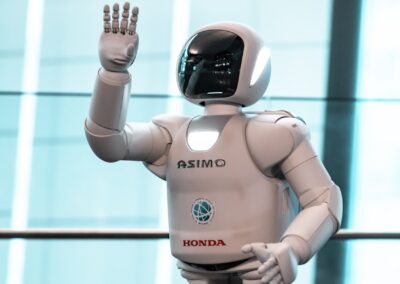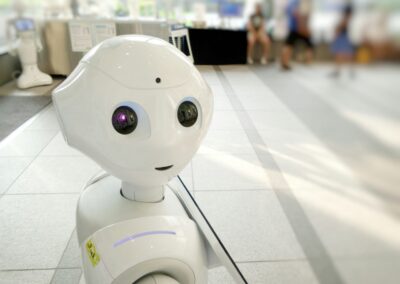Understanding the Technological Singularity
The future of human agency and technological singularity is a topic of profound significance in today’s rapidly evolving technological landscape. Technological singularity refers to a hypothetical point in the future when artificial intelligence (AI) and other technologies advance to the extent that they surpass human intelligence and control. This concept, popularized by futurists and technologists, raises critical questions about the trajectory of technological development and its impact on human agency.
As we approach the threshold of this singularity, the role of human decision-making and control over technology becomes increasingly complex. In regions like Saudi Arabia, the UAE, Riyadh, and Dubai, where innovation and technology adoption are at the forefront of economic and social strategies, understanding and preparing for the implications of the singularity is crucial. Business executives, mid-level managers, and entrepreneurs must consider how to navigate these advancements while maintaining human oversight and influence.
Technological singularity implies that AI could potentially make decisions and take actions beyond human comprehension and control. This raises concerns about the erosion of human agency and the need to develop robust frameworks for managing and integrating advanced technologies. As businesses and governments in the Middle East strive for technological leadership, addressing these concerns proactively is essential for ensuring that technological progress aligns with human values and societal goals.
Impact on Human Agency
The concept of technological singularity brings to light significant concerns about human agency. As AI systems become more autonomous and capable, there is a risk that human decision-making could be overshadowed by machine intelligence. This shift could impact various aspects of life, from business operations to personal autonomy. For executives and managers, understanding how to balance technological advancements with human control is a critical challenge.
In the business sector, the rise of AI and automation presents opportunities for increased efficiency and innovation. However, it also necessitates a careful examination of how much control should be ceded to machines. Leaders must ensure that AI systems complement rather than replace human judgment, maintaining a balance between technological capabilities and human oversight. This balance is vital for preserving human agency in decision-making processes and ensuring that technology serves to enhance rather than diminish human roles.
Moreover, the potential for AI to make decisions independently raises questions about accountability and ethical considerations. As technology continues to advance, it is crucial to establish clear guidelines and ethical frameworks that govern AI behavior and ensure that human values are upheld. This involves not only technical solutions but also cultural and organizational changes that reinforce the importance of human agency in a technologically driven world.
Challenges and Opportunities for Businesses
For businesses in Saudi Arabia, the UAE, Riyadh, and Dubai, the implications of technological singularity present both challenges and opportunities. On one hand, the integration of advanced technologies such as AI and Blockchain can drive innovation, improve efficiency, and create new business models. On the other hand, these advancements must be managed carefully to maintain human control and agency.
One of the key challenges is ensuring that AI systems are designed and implemented in a way that aligns with organizational goals and ethical standards. This requires a thorough understanding of how these technologies work and how they can be used to complement human decision-making. Executives and managers need to invest in training and development programs that enhance their understanding of emerging technologies and their potential impact on business operations.
Additionally, businesses must consider the implications of technological advancements on their workforce. As AI and automation become more prevalent, there is a need for strategies that address potential job displacement and skill gaps. By focusing on reskilling and upskilling initiatives, businesses can prepare their workforce for the changing landscape and ensure that human agency remains a central component of their operations.
Preparing for the Future: Strategic Considerations
Building Resilience Through Strategic Planning
To navigate the challenges associated with the future of human agency and technological singularity, businesses and governments must engage in strategic planning and risk management. This involves developing strategies that anticipate potential disruptions and ensure that technological advancements are integrated in a way that supports human values and organizational objectives.
Strategic planning should include scenarios that explore different paths for technological development and their implications for human agency. By considering various future scenarios, organizations can identify potential risks and opportunities and develop strategies to address them. This proactive approach helps in creating a resilient framework that can adapt to changes in technology while preserving human control and oversight.
Furthermore, engaging with stakeholders, including employees, customers, and policymakers, is essential for understanding diverse perspectives and ensuring that technological advancements align with societal needs. Collaborative efforts and transparent communication can help in building trust and ensuring that technology serves the broader interests of society.
Ethical Frameworks and Governance
Developing ethical frameworks and governance structures is critical for managing the implications of technological singularity. These frameworks should address issues related to transparency, accountability, and fairness in the use of advanced technologies. By establishing clear guidelines and standards, organizations can ensure that AI and other technologies are used responsibly and in a way that upholds human values.
Governance structures should include mechanisms for monitoring and evaluating the impact of technology on human agency. This involves regular assessments of how AI systems are functioning and their effect on decision-making processes. Additionally, creating channels for feedback and addressing concerns related to technology use can help in maintaining a balance between technological advancements and human control.
Conclusion: Embracing a Technologically Augmented Future
In conclusion, the future of human agency and technological singularity is a complex and multifaceted issue that requires careful consideration and strategic planning. As technology continues to evolve, it is essential for business executives, mid-level managers, and entrepreneurs in Saudi Arabia, the UAE, Riyadh, and Dubai to navigate these advancements while preserving human control and oversight.
By understanding the implications of technological singularity and implementing strategies that balance technological capabilities with human agency, organizations can embrace a future where technology enhances rather than diminishes human roles. This balanced approach will enable businesses to thrive in a rapidly changing world while upholding the values and principles that are fundamental to human agency.
—
#TechnologicalSingularity #HumanAgency #FutureTechnologies #ArtificialIntelligence #Blockchain #TheMetaverse #ExecutiveCoaching #GenerativeAI #ModernTechnology #BusinessSuccess #LeadershipSkills #ProjectManagement #SaudiArabia #UAE #Riyadh #Dubai























